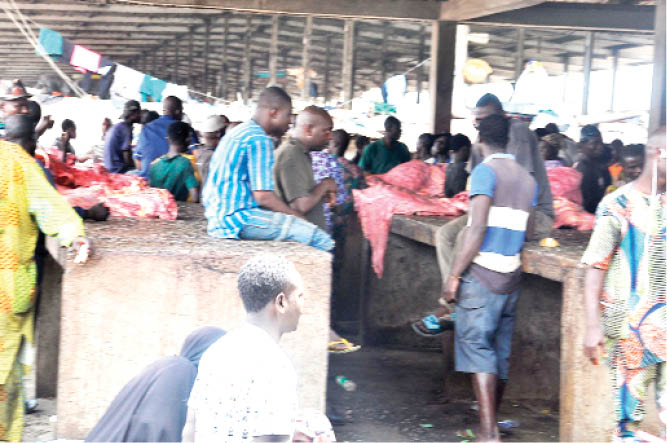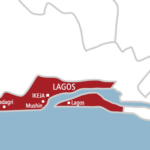The strike action embarked upon by the cattle and foodstuff dealers under the aegis of the Amalgamated Union of Foodstuff and Cattle Dealers of Nigeria (AUFCDN) has driven up prices of beef, food and vegetables in the South.
AUFCDN, an affiliate of the Nigerian Labour Congress (NLC), commenced a nationwide strike on Thursday following the expiration of a seven-day ultimatum given to the federal government to attend to their demands.
- Borno Confirms 10 Killed, 47 Injured In B/Haram Attack Shells
- Power System Collapses Lowest In 12 Years
The Union is demanding protection of its members, and payment of N475 billion compensation for lives of members and properties lost during the #EndSARS protest and the Shasa market crisis in Ibadan.
It also demands the dismantling of all roadblocks on federal highways where their members are harassed and money extorted from them by security operatives.
The strike entails closing all routes between the North and South for vehicles conveying cattle and food items. Such vehicles are stopped from reaching the Southern region.
Butchers in the South who still have stock have capitalised on the strike to hike prices. So have sellers in perishable food items shipped from the North.
Lagos is one of the states worst hit. Governor Babajide Sanwo-Olu had at the commissioning of a new semi-mechanized abattoir for cows and goats in Bariga recently said that the state consumes over 50 per cent of animal production in Nigeria.
A kilo of beef that sold for N1, 200 to N1, 500 before the strike now sells for N2, 000. A basket of tomato, which sold between N4, 000 to N6, 000 before now, ranges between N13, 000 to N15,000.
The chairman of United Butchers of Lagos State Abattoir Complex, Oko-Oba in Agege, Abdullahi Ahmed, said that before the strike, about 1,000 cows were slaughtered daily at the abattoir while close to 1,500 cows were slaughtered on Saturdays.
“Now, we cannot slaughter up to 200 because there are no cows. What we are slaughtering are the ones being reared here and they are small,” he said.
Ahmed told Daily Trust that the three cows he slaughtered on Saturday were bought at N630, 000. “I saw someone buy one cow at N900, 000 on Saturday. The situation is very terrible,” he said.
It was also learnt that less than five cows were slaughtered at Odo-Eran, in Ojo Cantonment on Saturday.
Daily Trust observed that many have turned to fish while those who had planned to buy fresh pepper and tomatoes for storage purposes could no longer do so.
Chineye Okoroafor, a trader at the Agbara market, a border community in Ogun State, said that dealers have resorted to hoarding goods.

Prices soar at Shasa
At Shasa Market in Ibadan, where a civil unrest resulted in the death of many people from the North and helped trigger the strike, prices have also gone up.
The market is a major destination for trucks conveying food items such as tomatoes, onions and peppers from the northern part of the country to the state.
A resident of Agodi, Mrs Yinka Ojebode said, “We know onion is just returning to its normal price but the crisis in Shasa has also affected other soup ingredients.”
The Babaloja of Shasa market, Chief Popoola Rasheed has denied reports that some Hausa traders have refused to return to the market.
“This is strange to me. We all attended our prayers on Friday. A session was led by Imam Hausa while another session was led by Yoruba imam,” he said.
Prices skyrocket in Rivers, Imo, Ekiti, Ogun, others
A survey by our reporter in markets located in Port Harcourt, Oyigbo and Eleme show that prices of tomatoes, onions, yam and meat have gone up by at least 50 per cent.
At Eke Oyigbo Market in Oyigbo, a set of custard bucket of tomatoes which was sold at N400 now cost N700 while the prices of onions and yam have also gone up.
A small yam tuber that cost N400 now goes for N800 while a large size of yam which cost between N600 to N800 now cost between N1500 to N1800 at Eleme Market.
A trader at Mile One Market in Port Harcourt, Musa Shehu, said many traders were hoarding their food items.
In Imo State, prices have hit the roof. Our correspondent, who surveyed Eke Onunwa, Relief Market, Cluster Market, Amakohia Market all in Owerri, discovered that most residents have turned to chicken as a source of protein.

This has also driven up the price of chicken. Old layers, which go for 1, 400 previously is now sold for N2,000.
At Relief Market, where foodstuffs from the North were offloaded, the prices of some items especially fruits, have increased.
A foodstuff dealer who gave her name as Mama Nkechi, said that the worst is yet to come if the current trend is not halted.
A kilo of beef in Akure, the Ondo State capital has risen from N1, 500 to N2,000. Other items also affected are onions, tomatoes, beans, potatoes and others.
According to Mrs Bukola Oyinlade, a basket of tomatoes, which was sold for N2,500 as of last week has jumped to N10,000. A sack of onion that was N9, 000 is now N15, 000 while a bag of beans now costs N40, 000 as against N36, 000.
The situation is the same in Ogun State, though the State Chairman of the Miyetti Allah Cattle Breeders Association of Nigeria (MACBAN), Abdulmumin Ibrahim said that its members are not part of the strike.
In Benin, Daily Trust observed that meat for under N500 is no longer available as a kilo of beef that sold for N1,300 now costs N1,500.
A cattle dealer, John Okumaiye, said they have not received orders that there would be no supply of cows but the price is affected by the rise in the dollar exchange rate.
“But as from Monday, we will know whether there is a strike or not because we usually get more supplies of cattle on Sunday,” he said.
The price of beans and sweet potatoes have also gone up as a bag of onion now costs N20,000 as against N13,000.
In Ekiti, a meat seller, Ganiyu Salau, said the cost of sourcing for the cows in nearby states like Kogi and Kwara has driven up the price of beef.
Our correspondent in Uyo, Akwa Ibom, reports that food vendors and restaurant owners are lamenting the high price of beef and other food items.
A restaurant owner in the University of Uyo, Ms Affiong Ekpo told our correspondent that she had been forced to buy goat meat at a much higher rate than usual, adding that beef is not even available.
“Goat meat is now expensive. I bought goat meat on Friday and it was on the high side. Ever since the strike was announced last week, the price of beef has skyrocketed,” she noted.
Our reporter also observed that some food items such as potatoes are scarce in the market.

Prices stable in Cross River, Anambra
Prices of yam, plantain, beans, rice remain stable in Cross River and Anambra but onions, tomatoes, carrots, cucumber are in short supply, forcing their prices to shoot up in Calabar. The items are mostly brought in from Cameroon and the northern states of Nigeria.
The people of Bayelsa State have described the situation as a challenge for farmers and people of the South to return to farming and make agriculture a top priority.
Afenifere, PANDEF berate action, warn of retaliation
Reacting to the development, the Yoruba socio-cultural group, Afenifere, described the action as a “thoughtless protest.”
The spokesman of the group, Yinka Odumakin, in a chat with Daily Trust threatened that the South could also block fuel supply to the North.
“This is a thoughtless protest by those who don’t think. If they think they can block tomatoes from coming to the South, what if the South decides to block fuel products from coming to the North, what will you do? Will you power your power needs with cow urine?
An Ijaw Elder statesman and spokesman of Pan Niger Delta Forum, PANDEF, Chief Anabs Sara Igbe said the strike action should not be a source of worry to the people of the region.
Chief Igbe who spoke with our reporter in Port Harcourt at the weekend said the threat should encourage the people of the region to go into farming saying that the region’s two seasonal farming period is an added advantage for the region to produce sufficient food for the people.
He warned that the North should not expect the supply of oil if they insist on cutting food supply to the region.
No going back — Dealers
Meanwhile, cattle and foodstuff dealers under the aegis of AUFCDN have vowed to continue their nationwide strike and sustain the enforcement of the blockade of the South.
The General Secretary of the union, Ahmed Alaramma, in a telephone interview with Daily Trust said the task force and members of the union are currently carrying out the enforcement on the blockade in Lokoja, the Kogi State capital.
Other places he listed were Jebba in Kwara State; Lafia, the Nasarawa State capital; Makurdi and Katsina-ala in Benue State; Tahla in Taraba State and other places that lead to the South.
When contacted, the Grand Matron of AUFCDN, Hajia Hauwa Kabir Usman, told our correspondent that she was on her way to Lokoja to supervise the enforcement of the blockade, saying they would never compromise.
From Abiodun Alade, Christiana T. Alabi, Eugene Agha, Abdullateef Aliyu (Lagos); Jeremiah Oke, Ibadan, Victor Edozie (Port Harcourt), Bola Ojuola, Akure, Peter Moses (Abeokuta), Usman A. Bello, Benin, Raphael Ogbonnaiye, Ado-Ekiti, Iniabasi Umo, Uyo, Eyo Charles (Calabar), Bassey Willie (Yenagoa), Jude Ohajianya, Owerri, Titus Eleweke (Awka) & Idowu Isamotu (Abuja)

 Join Daily Trust WhatsApp Community For Quick Access To News and Happenings Around You.
Join Daily Trust WhatsApp Community For Quick Access To News and Happenings Around You.


